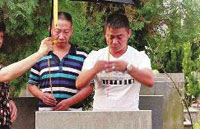Illegal protest organizer convicted of subverting state power, given suspended sentence
(Xinhua) Updated: 2016-08-02 20:15TIANJIN -- Zhai Yanmin, an unemployed resident of Beijing, was sentenced to three years in prison with a four-year reprieve after being found guilty of subverting state power Tuesday.
Tianjin No. 2 Intermediate People's Court ordered that Zhai, 55, will have to serve a minimum three-year term should he fall foul of the law within the four-year probation period. The court also deprived Zhai of his political rights for four years.
He pled guilty and declined his right to appeal.
Zhai was first exposed to concepts such as the "color revolutions" and "peaceful transition" online, the court said in a statement. He then joined an underground church led by Hu Shigen and gradually developed plans to overthrow the state socialist system.
Since 2012, Zhai has attempted to incite people to subvert state power by use of the online resources, the court said in a statement.
Zhai, together with underground church members and lawyers, engaged and managed illegal petitioners to organize public gatherings, hype up legal cases and incidents, attack the country's judicial system and carry out activities aimed at subverting the state power and socialist system, the statement said.
These activities endangered the state and society, it added.
"I accept all the charges," Zhai said in his final statement, "With the help and education of the government, I recognize the severity of my crimes. I plead guilty and express my sincere remorse.
"I am sorry to the country and my family... If I could go back I would never have become a member of hostile forces or associated with those individuals driven by ulterior motives," he said.
He added that he would like to be used as an example of the consequences of listening to and supporting hostile forces overseas and at home, and to inform the public of the dangers of the so-called "democracy," "human rights" and "public benefits" flaunted by them as a mask for criminal activities.
The court handed down a light sentence because he confessed, testified against others and repented, according to court statement.
Moreover, the court decided that Zhai posed no major threat to the community, it said.
The second branch of the People's Procuratorate of Tianjin Municipality filed charges against Zhai with Tianjin No. 2 Intermediate People's Court on July 15.
To safeguard the defendant's rights and interests and ensure a fair and efficient trial, a pretrial conference was held on July 22. It was attended by the prosecution team, defendant and defence counsel, presiding judge Cai Shuying said.
During Tuesday's trial, Cai informed the defence team of Zhai's rights and obligations in litigation.
The defence team had no objection with any of the evidence used in the trial.
Altogether 48 people, including 20 journalists from home and overseas observed the trial.
Prosecutors told the court that Zhai, together with three others -- Hu Shigen, Zhou Shifeng and Li Heping -- had conspired and plotted to subvert state power, and had "established a systematic ideology, method and steps to achieve it."
The defendant was accused of organizing multiple mass protests to influence public opinion and court sentences. One such case was a fatal shooting incident at a railway station in Heilongjiang Province in May 2015.
On May 2 of 2015, police officer Li Lebin shot dead Xu Chunhe at Qing'an County Railway Station. Xu had attacked Li and continued to assault the police officer despite multiple warnings. Follow-up investigations confirmed that Li had acted within the law.
After the shooting, Zhai organized protests at the railway station and in front of the county government buildings in support of Xu.
Zhai influenced online opinions and led public demonstrations that misrepresented the incident as police brutality.
Moreover, lawyers were organized to turn up at protest locations so that the issue gained more traction, Zhai said in his testimony adding that, "they all followed a fixed process."
Once an incident had become a "hot issue," lawyers, citizens and petitioners would fan the flames online and plan further protests with each individual assigned "work" for each activity, Zhai said.
"I was the 'chief commander' on site. I attacked current laws and smeared the image of the police," he said.
"We wanted every issue to gain as much exposure as possible, so we would send ordinary people out on the streets and initiate conflict between the people and officials. We wanted the international community to interfere, (with the aim of) overturning the CPC and launch our own 'color revolution,'" Zhai continued.
When asked about the motivation behind his crimes, Zhai said he hated the government and the political system because of a failed business venture. In addition, he said he had been radicalized by people with ulterior motives.
According to the evidence presented in court, Zhai met with 15 people, including Hu Shigen, Zhou Shifeng and Li Heping, in a Beijing restaurant on Feb. 1, 2015. The discussion covered how they could use the workers' rights movement and other sensitive incidents to promote their own agenda.
"We had met at the restaurant to gather lawyers like Zhou and Li, 'citizen movement' leaders like Hu and 'doers' like me to discuss how to topple the current regime, we wanted to overthrow the CPC," Zhai confessed, adding that they reviewed the subversive activities of the previous year, and formulated plans for 2015.
- Top court clarifies law at sea
- Nida's landfall brings travel to a standstill
- Xinjiang toughens anti-terror stance
- Tokyo's white paper on defense policy 'full of lies'
- Typhoon Nida lands in South China's Guangdong
- Geneticist defends his groundbreaking technique
- New Hainan port opens as annual fishing ban ends
- Navy widow tells of pain of husband's death
- China's lunar probe confirms no water on the moon
- Minister: PLA to firmly protect maritime rights










